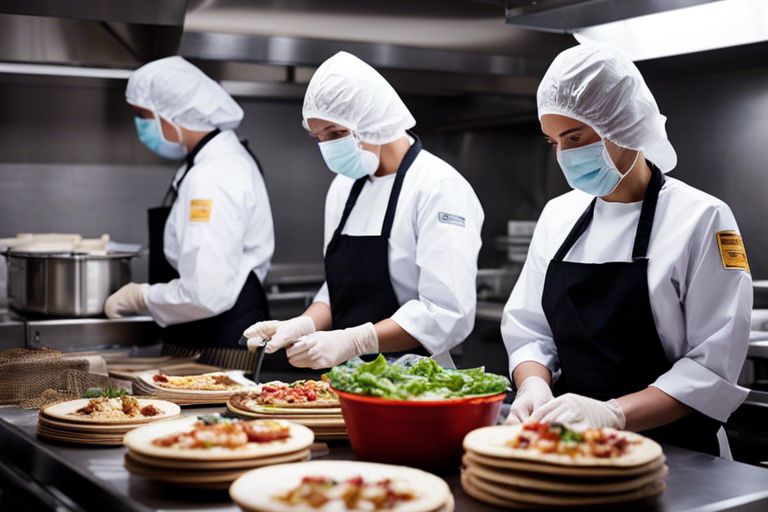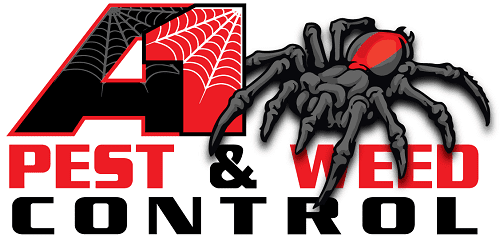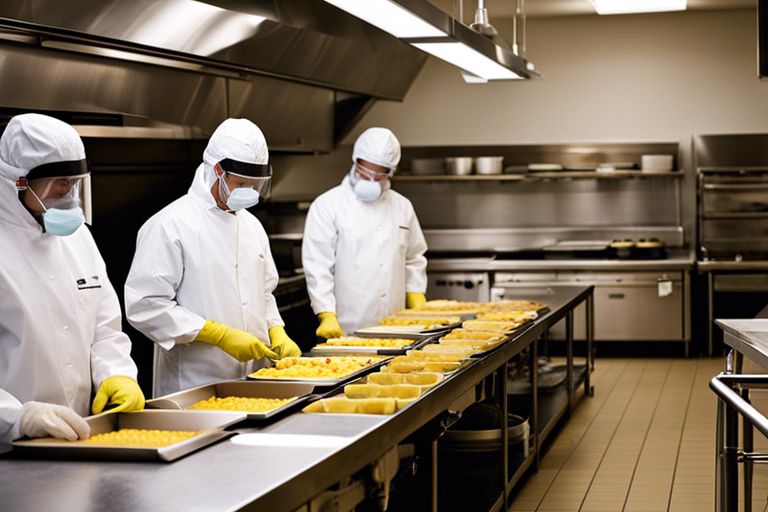It’s crucial to understand the regulations governing the food pest control industry in Melbourne to ensure the safety and compliance of food establishments. These regulations play a vital role in safeguarding public health by ensuring that pest control measures are effectively implemented and monitored within food premises. By staying informed about these regulations, businesses can maintain a pest-free environment, meeting the required standards and protecting the well-being of their customers.
Key Takeaways:
- Regulatory Standards: The food pest control industry in Melbourne is strictly regulated to ensure the safety and quality of food products.
- Licensing and Certification: Pest control operators must hold valid licenses and certifications to practice in Melbourne, demonstrating their knowledge and expertise in handling food pests.
- Adherence to Guidelines: Operators must adhere to industry guidelines and best practices to prevent contamination and ensure compliance with food safety regulations.
- Inspections and Audits: Regular inspections and audits are conducted to monitor pest control measures in food establishments and maintain high standards of hygiene.
- Training and Education: Ongoing training and education are vital for pest control operators to stay updated on the latest regulations and techniques for effective pest management in the food industry.
Legislation Governing Food Pest Control in Melbourne
Federal Regulations and Standards
To ensure the safety and quality of the food supply chain in Melbourne, the Australian government has established various regulations and standards that govern the practices of the food pest control industry. These regulations are enforced by the Department of Agriculture, Water and the Environment, which oversees the compliance of businesses with the Food Standards Australia New Zealand (FSANZ) Code.
State-Level Legislation in Victoria
Any business involved in food pest control in Melbourne must also adhere to specific state-level legislation in Victoria. The Department of Health and Human Services (DHHS) is responsible for regulating the industry at the state level, ensuring that businesses comply with the Public Health and Wellbeing Act 2008 and the Food Act 1984.
Another important aspect of state-level legislation in Victoria is the requirement for businesses to obtain relevant licenses and permits to operate legally in the food pest control industry. These licenses are issued by the DHHS and serve as a means to monitor and regulate the activities of businesses to ensure compliance with health and safety standards.
Licensing Requirements for Pest Control Operators
Training and Certification Processes
If you are looking to become a pest control operator in Melbourne, you must undergo specific training and certification processes to ensure you are equipped with the necessary knowledge and skills. Operators need to complete a government-approved training program that covers topics such as pest identification, behavior, and safe handling of chemicals. Once the training is completed, you must pass a certification exam to demonstrate your understanding of pest control best practices.
Renewal and Continuous Education
Education is a key component of maintaining your pest control operator license in Melbourne. Regular renewal of your license is required, typically every one to three years depending on local regulations. In addition to renewal, operators must participate in continuous education to stay updated on the latest pest control industry trends, techniques, and regulations. This ongoing education ensures that operators are providing the most effective and safe pest control services to their clients.
Renewal of your license often involves completing a certain number of continuing education credits or attending industry conferences and workshops. By staying current with advancements in pest control, operators can enhance their skills and remain compliant with state regulations.
Pest Control Methods and Restrictions
Approved Chemical and Non-Chemical Treatments
On the front of pest control methods, the use of both chemical and non-chemical treatments is regulated in Melbourne to ensure the safety of consumers and the environment. Approved chemical treatments must comply with strict guidelines set by the Australian Pesticides and Veterinary Medicines Authority (APVMA) to guarantee their effectiveness and safety. Non-chemical treatments, such as trapping and exclusion techniques, are encouraged as a more environmentally friendly approach to pest control.
Environmental and Health Safety Standards
Pest control companies in Melbourne must adhere to stringent environmental and health safety standards in their practices. This includes using pesticides that have been approved by regulatory bodies and following protocols to minimize the risk of exposure to both humans and non-target organisms. Additionally, companies are required to properly dispose of waste generated during pest control operations to prevent environmental contamination.
Pest control technicians are also required to undergo training on handling chemicals safely and must wear appropriate personal protective equipment during treatments to prevent exposure. Regular audits and inspections are conducted to ensure that companies are in compliance with these standards, protecting both public health and the environment.
Compliance and Enforcement
Role of the Australian Pesticides and Veterinary Medicines Authority (APVMA)
On the forefront of ensuring the safety and efficacy of pest control measures in the food industry is the Australian Pesticides and Veterinary Medicines Authority (APVMA). This regulatory body plays a crucial role in assessing and registering pesticides and veterinary medicines, setting standards for their use, and monitoring compliance with regulations.
Inspections and Audits of Food Facilities
Compliance with pest control regulations in food facilities is monitored through regular inspections and audits conducted by regulatory agencies. These inspections ensure that food facilities are implementing appropriate pest management practices, maintaining a pest-free environment, and adhering to all relevant regulations. Non-compliance can result in warnings, fines, or even closure of the facility.
The enforcement of pest control regulations in food facilities is a critical aspect of ensuring food safety and protecting public health. Inspections and audits help to identify any potential risks or violations, allowing authorities to take necessary actions to rectify the situation and prevent harm to consumers.

Record Keeping and Documentation
Mandatory Records for Pest Control Interventions
Despite the size or scope of a food pest control operation in Melbourne, the importance of keeping accurate and up-to-date records cannot be understated. It is a mandatory requirement for pest control companies to maintain detailed records of all pest control interventions conducted at food premises. This includes but is not limited to treatment dates, substances used, and the areas treated.
Keeping precise records not only ensures compliance with industry regulations but also aids in tracking the effectiveness of pest control measures over time. In the event of an audit or inspection by health authorities, these records serve as vital documentation to demonstrate that proper pest control protocols have been followed.
Data Protection and Privacy Regulations
Keeping sensitive data secure is a top priority in the food pest control industry in Melbourne. Data protection and privacy regulations dictate that all records relating to pest control interventions must be stored securely and access should be restricted to authorized personnel only. This includes safeguarding information such as client details, treatment histories, and any sensitive data collected during pest inspections.
Control measures must be put in place to prevent unauthorized access or the misuse of confidential information. This may involve encryption of electronic records, secure storage of physical documents, and regular monitoring to ensure compliance with data protection laws.
Pest Control in Organic Food Production
Your industry codes of practice play a crucial role in ensuring that pest control activities in organic food production adhere to strict guidelines and regulations. Organic farming relies on natural processes and the use of organic inputs to maintain a healthy ecosystem, making it vital to comply with industry standards to uphold the integrity of organic products.
Specific Regulations for Organic Certification
Food pest control in organic food production is subject to specific regulations outlined by certification bodies to ensure that organic standards are met. These regulations typically restrict the use of synthetic chemicals and require the implementation of holistic pest management strategies to minimize the impact on the environment and human health.
Integrated Pest Management (IPM) Strategies
Management of pests in organic food production often involves Integrated Pest Management (IPM) strategies. IPM is an environmentally sensitive approach to pest management that relies on a combination of techniques such as biological control, habitat manipulation, and use of resistant varieties to manage pest populations effectively while minimizing risks to human health and the environment.
Understanding the principles of IPM is vital for organic food producers to establish sustainable pest management practices that are in line with organic certification requirements. By implementing a comprehensive IPM program, organic farmers can effectively control pests while maintaining the ecological balance of their farms and producing high-quality organic food.
Emerging Trends and Future Regulations
Technological Advancements in Pest Control
All pest control companies in Melbourne are embracing the latest technological advancements to improve their services. From the use of remote sensing devices to thermal imaging cameras, these technologies are revolutionizing the way in which pests are identified and treated. For example, some companies are using drones equipped with sensors to detect pest activity in hard-to-reach areas, allowing for targeted treatments that are more effective and environmentally friendly.
Potential Regulatory Changes and Updates
Advancements in pest control technologies have also prompted discussions about potential regulatory changes and updates in Melbourne. Government agencies are considering implementing stricter guidelines for the use of certain chemicals and pesticides to minimize their impact on public health and the environment. Additionally, there is a push for more transparency and accountability in the industry, with calls for mandatory reporting of pest control activities and outcomes to regulatory bodies.
Control over the pest control industry in Melbourne is expected to become more stringent in the coming years, with a focus on sustainable and eco-friendly practices. Pest control companies will need to stay ahead of these potential regulatory changes and updates to ensure compliance and maintain their credibility in the industry.
Final Words
Following this overview of the food pest control industry regulations in Melbourne, it is clear that stringent measures are in place to ensure the safety and integrity of the food supply chain. By adhering to these regulations, businesses can not only prevent infestations but also maintain consumer trust and meet legal requirements.
It is imperative for food businesses to stay informed about the latest regulations and work closely with experienced pest control professionals to create a comprehensive pest management strategy. Through a proactive approach and continuous monitoring, businesses can effectively control pest issues and maintain high standards of hygiene in the food industry.
FAQ
Q: What are the regulations for the food pest control industry in Melbourne?
A: The food pest control industry in Melbourne is regulated by the Department of Health and Human Services, the Food Standards Australia New Zealand, and local councils. Pest control companies must adhere to strict guidelines to ensure the safety of food products and consumers.
Q: What qualifications are required to work in the food pest control industry in Melbourne?
A: In Melbourne, individuals working in the food pest control industry must hold a Pest Control License issued by the Department of Health and Human Services. Additionally, training in food safety and pest management is imperative to meet industry standards.
Q: What are the common pests found in food facilities in Melbourne?
A: Common pests found in food facilities in Melbourne include rodents, cockroaches, flies, and ants. These pests pose a significant threat to food safety and can lead to contamination of food products if not properly controlled.
Q: How often should pest control be conducted in food facilities in Melbourne?
A: Pest control should be conducted regularly in food facilities in Melbourne to prevent infestations and ensure compliance with regulations. The frequency of pest control treatments may vary depending on the type of pest, level of infestation, and the specific requirements of each facility.
Q: What are the consequences of non-compliance with food pest control regulations in Melbourne?
A: Non-compliance with food pest control regulations in Melbourne can result in fines, closure of the facility, loss of reputation, and legal action. It is imperative for food businesses to prioritize pest control measures to protect public health and maintain compliance with industry regulations.

